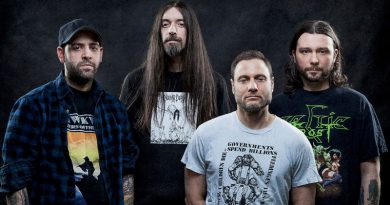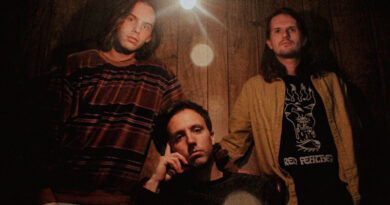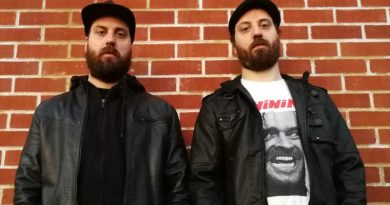In Search Of Tone: Sean McVay Of King Buffalo
My list of guitar players I look up to is growing everyday. Sean McVay of King Buffalo is right up there at the top of my list. Having the opportunity to ask him questions about how to improve playing and what he uses to get those sweet tones is an honor. King Buffalo has taken on quite the challenge by releasing three albums this year. Getting Sean’s perspective on how to create so much music and have it sounding unique is certainly interesting. The Burden Of Restlessness is an incredible album and with the restrictions changing from album to album (as you’ll read below) I’m even more excited for what’s to come!

Thank you for meeting with me toady, I’m a big fan so let’s jump right into gear with what amps you’re currently using?
Pretty much exclusively Fender stuff. I have a 1973 Fender Twin that’s been by main amp for a long time. It’s been on every King Buffalo record and it’s pretty much the only amp I’ve toured with for the last five years or so. I did a couple little modifications, nothing really too crazy. I did have it black faced and I do run it at half power so two of the power tubes are pulled out and I replaced the speakers with an Eminence Texas Heat and a Warehouse ET65.
What made you take out two power tubes?
It just makes it a little bit quieter. I don’t know if you’ve ever played a Fender Twin, but they’re pretty brutal and can be super super loud. That’s one of the great things about them, but how often do you max out their volume, especially playing in small clubs like we do. Every time the guitar is too loud. In order for it to get a good sound, you have to turn it up and in a small room that’s typically not treated well with acoustic treatment, that guitar is just spraying off everything and eating up the room.
I have a 1973 Fender Twin that’s been by main amp for a long time…
I honestly don’t know how much it’s really doing. The modification halves the output wattage and also changes the speaker load from 4 ohms to 8 ohms. What I used to do is unplug one of the speakers which takes an 80 Watt Twin that’s a 2×12 into a 40 Watt 1×12. That’s a common way to do it, but I still wanted the two speakers so I put in two 16 ohm speakers to make it 8 ohms.
I’ve never played a Twin but I’ve heard Fender amps are very loud. I was considering buying a used Fender Deluxe Reverb someone had for sale locally but in my small room here, my micro dark can get too loud haha.
I’ve never had a Deluxe Reverb. I think they’re fabulous though and they’re only 22 watts. They are way less intense than a Twin and at home it could go either way. They can be too much, but they could be fine because they break up a lot a lot lower volume than the Twin. Also, if you want those chimey cleans you can definitely get that in the bedroom setting, but they break up around 4 or so and you’ll never get a Twin to break up at 4.

Interesting, thank you for that information. When using the Twin do you try and use the distortion from the amp or a clean tone?
There’s no extra setting on the Twin. You have the normal channel, and you have a vibrato channel. One of the other mods I did was I pulled the normal channel pre-amp. Normally when you plug in your guitar it’ll feed through the normal channel and then to the vibrato channel, but I always use the vibrato channel. I pulled the pre-amp tube from the normal channel so I can bypass that and go straight to the vibrato channel, which supposedly helps but we’re talking like a tiny little hummingbird on a rhino [laughs], but if you do all these little things maybe you can make enough of a difference. I always use the vibrato channel, it’s 100% clean and all my distortion and fuzz comes from pedals.
Well, I think all these modifications you make are working because your tone is impressive.
I’m sure you know as a guitar player your tone is always changing because you’re never happy with it. One day you’re like that was the best sound you ever created, the next day you’re like this is garbage I need to get rid of everything I own. I need a new amp [laughs].
I pulled the pre-amp tube from the normal channel so I can bypass that and go straight to the vibrato channel…
Yeah, I know what you mean. I constantly change settings and look for new gear daily [laughs]. You mentioned your distortion comes from pedals. What is currently on your pedal board?
Currently, well I guess, I’ll say for the majority of King Buffalo, the main pedals were the standard Vox V847 Wah. That’s the first thing in the chain, then a Fuzz Face Clone that I’ve built off a kit from BYOC (Build Your Own Clone) were you can build your own kits. It’s a Fuzz Face Clone from them with BC109 silicon transistors. I don’t know if this is too detailed [laughs]. So that was my fuzz, then my overdrive for years is a pedal called the Soul Drive by a company called Lightning Boy Audio, it’s sort of a tube overdrive and it’s a natural sounding pedal. If I want to get really fuzzy I have them both on together but most recently with Dead Star I tweaked some things and I used a Stomp Under Foot La Scatola Nera pedal, it’s like a fuzz with an extra octave circuit so it’s like a Big Muff with an octave circuit. It’s a pretty cool pedal and I use that on Dead Star and The Burden Of Restlessness, then I’m using it on the future records as well.
I keep going back and forth as far as overdrive pedals go. Recently I just wanted to try some new stuff, I’ve actually been using a Boss Blues Driver, just a stock cheap one I got it for $40 off Craigslist and it’s been pretty cool. It’s not as natural and responsive or dynamic as Lightning Boy but it’s a little more predictable and I can get more dirt out of it and I’m trying to experiment more with my guitars volume.
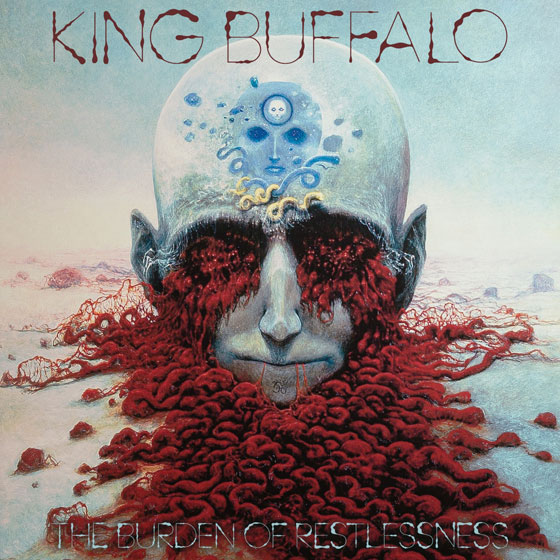
That’s cool, what are you using after distortion for delay and modulation?
OK, so I go out of the overdrives into a phaser pedal which gets used here and there. It’s a Whirlwind Rochester Series Phase 90 Clone. It’s like a standard Orange Box Phase 90 but Whirlwind has ties to Rochester which is my hometown and apparently, they’re the only ones that have the original patent of the Phase 90 circuit. Supposedly MXR says the same thing, whatever, I have the Whirlwind one because it was cool and it’s the standard one knob phaser and that goes into the Strymon Timeline, which has been my main delay pedal for a while. I started using it after we recorded Repeater, before that I was using a TC Electronics Flashback X4 and I love that pedal, it’s fantastic and sounds great but the only problem was it was a pain in the butt to dial-in exact BPM’s and Repeater is very much reliant on it. I love the Timeline because I’m able to do everything I can with a Flashback and pre-set and save the 64 BPM that’s required for Repeater. It offers a couple extra bells and whistles, like now I have a pre-set for every song where with a Flashback I only have three I can select from.
the main pedals were the standard Vox V847 Wah. That’s the first thing in the chain, then a Fuzz Face Clone that I’ve built off a kit from BYOC…
I have a Way Huge Aqua Puss I got recently, and I like it but I want something with longer delays too. So that’s some really cool information, thank you.
That’s a great analog style delay. I’ve always been drawn to digital delays however. Especially now the digital stuff can emulate analog stuff really well. The Timeline, for a long time, was the top dog and I came at it 11 years ago. It’s pretty old at this point but I can still do a lot of great things on it, and it has a looper built in. It’s not cheap by any means but you can do all sorts of things with it. Actually, on the records we’re putting out this summer, I’ve also used it for all the vocal delay because it sounds so good.
Wow, that’s cool using it for vocals as well! What do you use after delay?
TC Electronic Hall Of Fame Reverb. It’s pretty simple and it sounds great. I’m going to rag on TC Electronics for a moment if you don’t mind [laughs]. Their foot switches are the worst and they’re proprietary, so you can’t buy a different switch for like five bucks and switch it out, that drives me crazy [laughs]. But the reverb sounds are great, and I got it about 10 years ago. There are 1 million options out there, but I like this one.

Let’s talk about guitars, one vs many?
I have three guitars [laughs]. I guess if you say guitars that found their way onto King Buffalo records then I have four. I’ll start at the beginning; Orion was done 99% of the time with a Fender Light Ash Stratocaster stock. It’s a Korean Fender, it has really cool birds eye maple neck and Seymour Duncan single coils, which sounded really cool, but as I made the permanent switch to the Fender Twin, they sound too bright and with the Twin up loud, it’s going to rip peoples ears off [Laughs].
So, I got this Hagstrom, which I had at the time of Orion, but I hated it. Going from single coils to a semi-hollow with humbuckers was too much of a change too soon and it sounded like I was playing through bunch of pillows. I found a pair of used 59 Seymour Duncan pickups that I had put in, the guitar opened right up and that became my main guitar for years. That’s a guitar I used on Repeater, Longing To Be The Mountain, Dead Star and it’s the only guitar I’ve toured with for a long time.
Going back to that Strat, I ended up putting TV Jones Power’Tron’s into it. It never made it onto a record, but I did do a couple of tours with it here and there because I had a decent fly case for the Strat, so when I went to Europe, I brought that guitar with the Power’Trons and it was fine, but it wasn’t the same as my Hagstrom.
Now, for upcoming projects, I’ve taken that same Strat and put Seymour Duncan Pearly Gate humbuckers in and that’s been my main guitar. I also have another Hagstrom Super Swede that has Lindy Fralin noiseless P90s in it and I’ve been bouncing between the two of those. For the new record The Burden Of Restlessness it’s been a balance between those two guitars and I’m trying to stick to just those two for now.
I’ve taken that same Strat and put Seymour Duncan Pearly Gate humbuckers in and that’s been my main guitar…
Is there a piece of gear you have had for a long time that you would never get rid of?
I’ll probably never get rid of anything [laughs]. I have a hard time with that. I’ve gotten rid of pedals here and there that I know I’m never going to use, but I’m a recording engineer, so I figure if I have it, I might as well keep it because I’m that guy that thinks I’m going to need that in 15 years for that specific tone [Laughs]. I have garbage amps laying around that don’t even work properly because I think one day I’m going to need that and I’ll fix it knowing that I never will, but I keep them. Yeah, I probably won’t get rid of anything.
I understand that. Moving on to song writing what is the process like and has it changed especially when wiring material for three albums in one year?
Yeah, it has changed a bit but the basic model for most for our catalog, particularly all of Orion, minus maybe Down From Sky, starts with jams. We write these really long arrangements just by playing for a half an hour straight, I record all of our jams, take them home and say OK out of all of that, this part is cool, that part is cool and then I’ll start cutting things up, mashing pieces together and start sending the guy’s ideas like that and we’ll build a song that way. Once we have a pretty solid arrangement then I’ll start adding vocal melodies and lyrics and that’s how most of our songs have been written.
More and more I’ve been doing some stuff at home and bringing it to the band, but most of our stuff still comes from jams and that works best for us. Longing To Be The Mountain and Dead Star had a few songs that I wrote at home and brought to the band, but not a lot, just a few. I’ve even written some drum parts, and bass parts, and try to put all things together then bring to the band, that is effective sometimes, but it is a razor edge. If they’re not seeing my vision for the song, it can become problematic. It’s hard to say ‘no you have to play it this exact way’ so I try to start the songs by all of us jamming, piecing it all together and then I’ll have the final say on the arrangements, vocal melodies and lyrics. For the most part it’s pretty collaborative and I think all the new stuff were all jams.
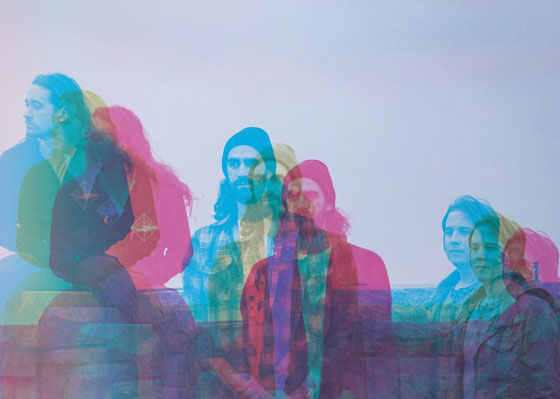
How do you create unique music without repeating yourself or others?
[Laughs] I don’t know if I’m the right person to ask that question. That’s a constant struggle. One simple way to do it is to make little rules for yourself. For example, I’m only going to use this guitar on this record or set your pedalboard ahead of time. I have these phasers, these overdrives and this is all I can use. Limiting your options is a good way to start and then changing those options from record to record.
For Dead Star I kind of created an alternate tuning and my rule was all the songs have to work in this tuning. It’s not a crazy tuning, it’s just we usually play in drop C and have some songs in D standard. Dead Star is in D standard with a sharp fourth string, so what would be an F is now back to its normal G. Like I said, it’s not anything super crazy, but it does change the way I play the leads and allows me to do a little more open stuff, like one finger power cords on those middle strings. I’d say I’m gonna do this whole record in this tuning and at the time I was feeling in a rut. Like you said, how do you create music without sounding the same, and while I was writing, everything was sounding the same to me, so I tried that, and I’d think it still sounds similar, but it was a hurdle to work through it in my own mind.
For the new albums, the restrictions are gear based where I’m only going to use these pedals and switch between these guitars. On each record we always try to have something different we’re focusing on. Luckily, we’ve been a band for seven to eight years now and we’re constantly changing as people during that time, so things will change, and I am always trying to find something new to push myself. Simple answer, would be gear changes, listen to different music or even stop listening to music all together, especially during writing. I try not to listen to anything really because I end up re-creating it by accident.
For the new albums, the restrictions are gear based where I’m only going to use these pedals and switch between these guitars…
I think you were the right person to ask because that is very cool advice. On a similar note, what do you do if you’re having an off day?
When, I have an off day it’s a real off day. I take it very rough, and it happens more often than I’d want to ever admit. It’s just those days where a simple thing like a chord doesn’t sound right and it’s frustrating. I mean I think the best thing is get through it, take a break and hope those days don’t happen on a recording day. Sometimes they do and it really sucks, but ideally if it’s during rehearsal, then it’s like OK, I know I have to work on these things and whatever, its rehearsal I will get through it. You take it seriously, but it’s not gonna make or break anything.
Do you have any practice routines or warm-ups you do in a daily basis?
I try to but typically I’m not good in that regard. I do think it’s important and for years I didn’t really do any of that. I just would pick up and play but I got to the point, actually this passed year, I had a serious hand problem where I had sharp shooting pains in my index finger and I couldn’t even really play guitar. I think it’s from over playing with a bad technique. I had to go to a physical therapist, rehab my hand and I didn’t play guitar for a long time.
After that, I started to do some standard exercises and use a proper technique while playing to a metronome and it’s made a huge difference. I can feel bad habits starting to creep in, particularly when in the full band setting and you get the juices flowing, you’re excited about it and especially when singing at the same time, stomping on pedals, hitting the synthesizer with my feet, then all of a sudden I’m cheating and doing bad stuff again [laughs]. But hand stretches are really huge for me and mobility exercises and trying to get in the habit of staying relaxed playing to a click, relaxed is definitely very good exercise for me.
I don’t know much about synthesizers, and this is the first I’m hearing about using them as pedals. Is that how you get those ambient sounds?
Yeah, we use lot of synth and pad stuff in the background. I can tell you exactly if you were thinking of a specific instance.
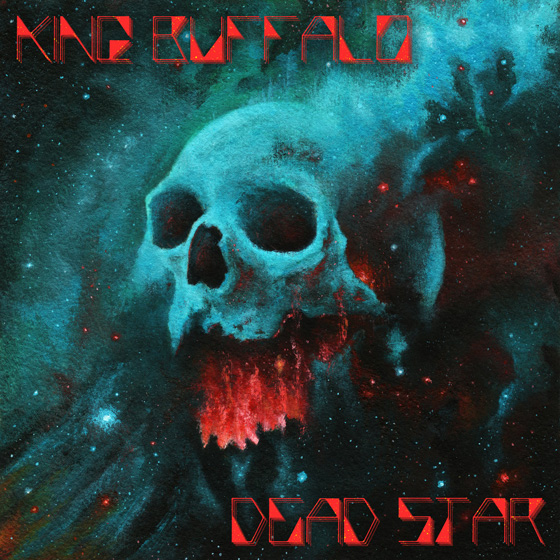
I guess specifically like the beginning of Red Star Part 1. I love those drone sounds with the Pink Floyd style leads that sound amazing.
Yeah, we do a lot of that. We have these little foot controllers that are 13-key foot controllers that run through a MIDI cable to our synthesizers, kind of like what Rush would do with the Taurus pedals. It’s basically a poor man’s version of that because those pedals are insanely expensive.
Very interesting. Going back to Red Star, that is currently my favorite but it’s hard to choose. Do you have a favorite song or part of a song you’re proud of?
I’m really proud of the new record. The Burden Of Restlessness is the first of three records we will release. Lyrically and song writing arrangements, that’s the one I’m most excited about and also the most nervous about because it’s a little bit different sounding as far as older stuff goes. I think Repeater is one of my favorite songs that we’ve done, things just lined up perfectly and it’s my favorite to play live. I’m also really proud of the way Cosmonaut turned out on the record but we haven’t been able to re-create that live. There’s a few songs like that. Cosmonaut, Dead Star, Echo Of A Waning Star, they sound so good on record but we haven’t been able to re-create it live.
Repeater is one of my favorite songs that we’ve done, things just lined up perfectly and it’s my favorite to play live…
I assume that’s difficult to do. I’ve never played live but I can see that could be difficult.
Yeah, it’s hard and there are some songs that when we recorded it, we know that it’s going be difficult to re-create live. Echo… was one of those, going into it we knew that it would be difficult and it’s not a banger [laughs] but it’s a cool sounding song and it has a lot of layers that would be tough to re-create live. Even just performance wise the guitar and voice arrangement are kind of awkward to do in one take.
Thank you so much for taking the time to answer my questions and teach me some valuable information to improve my playing!
I also asked Sean where’s the best place to purchase vinyl from the band was – for the US head over to King Buffalo‘s official website and for European fans check out the Stickman Records website to get all the bands merch you’ll ever need!
Label: Stickman Records
Band Links: Official | Facebook | Bandcamp | Twitter | Instagram
Interviewed by: Josh Schneider

